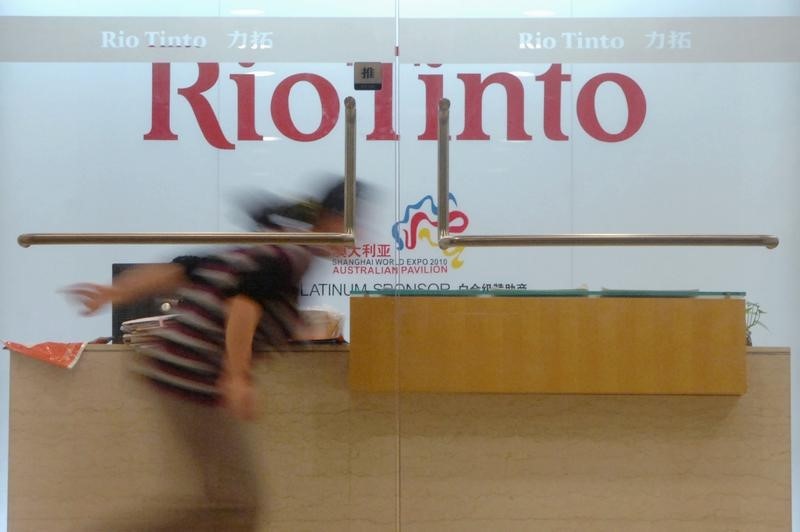(The opinions expressed here are those of the author, a columnist for Reuters.)
By Clyde Russell
LAUNCESTON, Australia, Nov 4 (Reuters) - Rio Tinto (LON:RIO)'s decision to quit the world's largest undeveloped iron ore deposit in Guinea is essentially a bet on how quickly and cheaply the new Chinese owners can develop the mine.
Investors have generally welcomed the sale of the Simandou project by Rio RIO.AX to Chinese metals producer Chinalco 3668.HK for between $1.1 billion and $1.3 billion, believing it rids the world's No.2 iron ore miner of an expensive and risky project in a developing country. has certainly battled to get any momentum going for the project in the West African nation, struggling to find financing for the planned 50-million tonnes a year mine, 400 kilometre railway and deepwater port.
Given the price tag was likely to stretch to at least $20 billion, it's hardly surprising that bankers baulked at the project, especially since virtually nobody believes there is going to be a global shortage of iron ore any time soon.
However, the main risk for Rio is if Chinalco is able to advance the project fairly quickly and start producing iron ore at a competitive cost.
Then the Chinese company would be able to use its home-ground advantage when dealing with Chinese steelmakers, who buy about two-thirds of the global supplies of seaborne iron ore.
But the longer the Simandou project takes to be completed, the more time Rio and other existing major iron ore miners such as Brazil's Vale VALE5.SA and BHP Billiton (LON:BLT) BHP.AX have to enjoy their dominance of Chinese markets.
While the major iron ore miners expanded capacity by too much in order to meet overly-optimistic forecasts for Chinese steel production, they are now benefiting from being high-volume, low-cost producers.
Both Rio and BHP are able to produce and transport a tonne of iron ore from their mines in Western Australia state to a port for less than $15 a tonne.
Freight, taxes and other costs will double that figure, but it still means the major miners are making healthy margins given the current cost and freight price of spot iron ore in southern China .IO62-CNI=SI is $64.50 a tonne.
This is almost double the $37 that iron ore prices dropped to in December last year, which was the lowest level recorded since spot price assessments began in 2008.
Iron ore's rally has been built largely on the back of firm demand from China, where some high-cost iron ore producers have been forced to shut at a time when steel output defied expectations of a drop and remained mostly flat.
The country's imports of the steelmaking ingredient rose to 762.5 million tonnes in the first nine months of the year, a gain of 9.1 percent from the same period last year.
The outlook for iron ore prices remains somewhat bright, given the last of the large new mines that have been built over the past few years are ramping up output, after which supply is largely expected to be steady.
Assuming Chinese and global steel output can hold relatively stable, or even grow slightly, it's reasonable to assume that iron ore will be able to maintain prices around current levels.
SIMANDOU CAN CHANGE THE GAME, WHEN IT ARRIVES
Simandou could upset the delicate re-balancing of the iron ore market when it is developed.
While Rio and the other major miners would no doubt prefer Simandou remains undeveloped, it's highly unlikely that Chinalco would pay more than $1 billion to buy out Rio if it didn't intend pushing ahead.
Chinalco may also find financing easier to secure with support from major Chinese state-owned lenders, and it may even be able to keep the project costs down by using contractors from China, who would charge less than the Western engineering companies that Rio would likely have employed.
A further thought is that the broad market assumption is that Chinalco will sell the iron ore to Chinese steelmakers.
While reasonable, this does ignore that Guinea is closer to Europe than it is to China, meaning Simandou could conceivably exploit any arbitrage between China and the Atlantic basin.
Western Europe imported 95.02 million tonnes of iron ore in the first 10 months of this year, according to vessel-tracking and port data compiled by Thomson Reuters Supply Chain and Commodity Forecasts.
Of this, almost half came from Brazil, with other major suppliers being Canada, Norway and South Africa.
While Norway has an obvious freight advantage in supplying to the rest of Europe, it's conceivable that Simandou may be very competitive against Brazilian and Canadian iron ore.
(Editing by Himani Sarkar)
